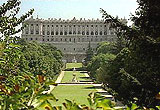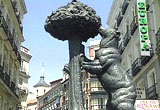西班牙首都-马德里
Madrid (Spain)
 Palacio Real (Royal Palace)Madrid may not have the Roman origins that get city historians hot and bothered, and it may be a comparative parvenu, selected from rural obscurity to become capital only in the second half of the 16th century, but it oozes a vitality and character that rarely fails to move. In no other European capital will you find the city centre so thronged so late into the night, as though some unwritten law forbade sleeping before dawn.
Palacio Real (Royal Palace)Madrid may not have the Roman origins that get city historians hot and bothered, and it may be a comparative parvenu, selected from rural obscurity to become capital only in the second half of the 16th century, but it oozes a vitality and character that rarely fails to move. In no other European capital will you find the city centre so thronged so late into the night, as though some unwritten law forbade sleeping before dawn.To experience Madrid is to explore its restaurants and eateries (小饭馆), prop up(原意是扶持、支持,这里是光顾的意思)its countless bars, and be swept up in the nocturnal (夜间的)madness of its music scene and clubs. Madrid has always been a city of immigrants and transients(过往旅客), and the result is an unusually open and accessible city. Ambitious programs to modernise the city are afoot(在进行中的), but the gatos (locals) of Madrid can rest assured that their town remains as refreshingly unlike Paris, London or Rome as ever.
 A bronze statue of Madrid's official symbol, a bear and a madrono (strawberry tree)
A bronze statue of Madrid's official symbol, a bear and a madrono (strawberry tree)Madrid is Europe's highest city (650m; 2100ft), and it's also surprisingly compact. The main north-south artery(干线,要道), Paseo de la Castellana (which turns into Paseo de los Recoletos and Paseo del Prado), connects the city's two main train stations, Chamartín and Atocha. The oldest quarters(老居民区)are squeezed in between Paseo del Prado (where you'll find the city's great art galleries) and the Palacio Real to the west. Midway, the barrios(西班牙,波多黎各,菲律宾等地地方行政区域)south-east of Puerta del Sol leading to the working-class district of Lavapiés are filled with seemingly endless restaurants, bars and cafes. The densest concentration of accommodation can be found around Puerta del Sol, Plaza de Santa Ana and the barrios of Malasa?a and Chueca (for pensiones and hostales), and along the Gran Vía (hotels).
Few visitors to Madrid would want to miss out on a visit to Museo del Prado, one of the art world's holy grails(本意是传说中耶稣最后晚餐所用之杯). Lovers of Spanish art will particularly enjoy the coverage given to the big three - Velázquez, Goya and El Greco. Wsith a museum this size you really should visit more than once, particularly as fewer than half of the collection is ever on view at any given time.